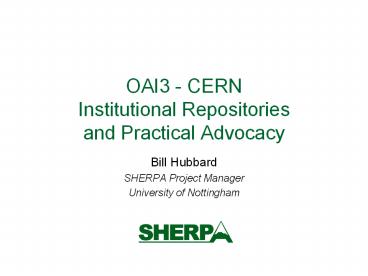OAI3 - CERN Institutional Repositories and Practical Advocacy - PowerPoint PPT Presentation
Title:
OAI3 - CERN Institutional Repositories and Practical Advocacy
Description:
Title: No Slide Title Author: University of Nottingham Last modified by: University Of Nottingham Created Date: 8/14/2002 1:19:14 PM Document presentation format – PowerPoint PPT presentation
Number of Views:96
Avg rating:3.0/5.0
Title: OAI3 - CERN Institutional Repositories and Practical Advocacy
1
OAI3 - CERNInstitutional Repositories and
Practical Advocacy
- Bill Hubbard
- SHERPA Project Manager
- University of Nottingham
2
SHERPA -
- Securing a Hybrid Environment for Research
Preservation and Access - funding JISC (FAIR programme) and CURL
- duration 3 years, November 2002 November 2005
3
SHERPA
- development partner institutions
- Nottingham (lead), Leeds, Sheffield, York,
Edinburgh, Glasgow, Oxford, British Library and
AHDS - associate partner institutions
- Birkbeck College, Birmingham, Bristol, Cambridge,
Durham, Imperial College, Kings College,
Newcastle, Royal Holloway, School of Oriental and
African Studies, University College London
4
Institutional Repositories
- e-Prints as research outputs
- hold multiple subjects
- part of institutional information service
- long-term existence
- . . . implications of these choices for advocacy
5
Implications and issues
- research cultures vary across subject-disciplines
- integrated into institutional information service
- repositories have a public face and
responsibilities - long term preservation commitments
6
Differentiate stakeholders
- three internal constituencies
- academics, administrators, librarians
- four external constituencies
- funding agencies, publishers, media, public
7
Academics
- as producers
- disseminate material
- get recognition
- as consumers
- find material
- get ready access
- as individuals
- they do not want more work
- things work ok
- involves cultural change . . .
8
Administrators
- inward management
- practical issues of information service
- ownership of IPR
- exposing and recording activities
- outward presentation
- who represents research?
- legal liabilities
- new possibilities as a public face
9
Librarians information professionals
- concerns of curation
- long-term preservation, long-term commitment
- additional work!
- creating, populating, advocating repositories
- impact on serials
- prices, changes
10
External constituencies
- funding agencies
- publishers
- media
- public consumers
11
Academics and cultural change
- things seem ok . . .
- affects working habits and reward structures
- centrally-driven initiatives vs. local
developments - monoscopic analysis is not enough . . .
- when to push and when to stop
- what makes cultural change?
12
Choices and possible paths
- academic-archiving vs. mediation
- back-catalogue vs. future output
- academics web-page
- departmental web-page
- . . . the emergent repository
13
SHERPA - progress
- repositories set up in each partner institution
- test papers being added
- negotiations with publishers
- discussions on preservation of eprints
- work on IPR and deposit licences
- advocacy campaigns starting
- sharing experiences and formulating strategies
14
Summary
- identify stakeholders
- identify their needs and viewpoints
- differentiate potentials, goals, returns
- differentiate change
- upgrading, process and cultural
- support needs, appeal to aspirations
15
http//www.sherpa.ac.ukbill.hubbard_at_nottingham.a
c.uk
16
Process of adoption
- Awareness
- Action
- Engagement
- Integration
- Sustenance and development
17
why institutional?
- institutions have centralised resources
- to subsidise repository start up
- to support repositories with technical /
organisational infrastructures - to deal effectively with preservation issues over
the long term - institutions get benefits
- raising profile and prestige of institution
- managing institutional information assets
- encourages an institutional identity in
intellectual output































